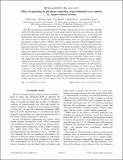Effect of squeezing on parameter estimation of gravitational waves emitted by compact binary systems
Author(s)
Vitale, Salvatore; Barsotti, Lisa; Dwyer, Sheila Elizabeth; Lynch, Ryan Christopher; Evans, Matthew J
DownloadPhysRevD.91.044032.pdf (1.037Mb)
PUBLISHER_POLICY
Publisher Policy
Article is made available in accordance with the publisher's policy and may be subject to US copyright law. Please refer to the publisher's site for terms of use.
Terms of use
Metadata
Show full item recordAbstract
The LIGO gravitational wave (GW) detectors will begin collecting data in 2015, with Virgo following shortly after. These detectors are expected to reach design sensitivity before the end of the decade, and yield the first direct detection of GWs before then. The use of squeezing has been proposed as a way to reduce the quantum noise without increasing the laser power, and has been successfully tested at one of the LIGO sites and at GEO in Germany. When used in Advanced LIGO without a filter cavity, the squeezer improves the performances of detectors above ~100 Hz, at the cost of a higher noise floor in the low-frequency regime. Frequency-dependent squeezing, on the other hand, will lower the noise floor throughout the entire band. Squeezing technology will have a twofold impact: it will change the number of expected detections and it will impact the quality of parameter estimation for the detected signals. In this work we consider three different GW detector networks, each utilizing a different type of squeezer—all corresponding to plausible implementations. Using LALInference, a powerful Monte Carlo parameter estimation algorithm, we study how each of these networks estimates the parameters of GW signals emitted by compact binary systems, and compare the results with a baseline advanced LIGO-Virgo network. We find that, even in its simplest implementation, squeezing has a large positive impact: the sky error area of detected signals will shrink by ~30% on average, increasing the chances of finding an electromagnetic counterpart to the GW detection. Similarly, we find that the measurability of tidal deformability parameters for neutron stars in binaries increases by ~30%, which could aid in determining the equation of state of neutron stars. The degradation in the measurement of the chirp mass, as a result of the higher low-frequency noise, is shown to be negligible when compared to systematic errors. Implementations of a quantum squeezer coupled with a filter cavity will yield a better overall network sensitivity. They will give less drastic improvements over the baseline network for events of fixed signal-to-noise ratio but greater improvements for identical events.
Date issued
2015-02Department
Massachusetts Institute of Technology. Department of Physics; MIT Kavli Institute for Astrophysics and Space ResearchJournal
Physical Review D
Publisher
American Physical Society
Citation
Lynch, Ryan et al. “Effect of Squeezing on Parameter Estimation of Gravitational Waves Emitted by Compact Binary Systems.” Physical Review D 91.4 (2015). © 2015 American Physical Society
Version: Final published version
ISSN
1550-7998
1550-2368